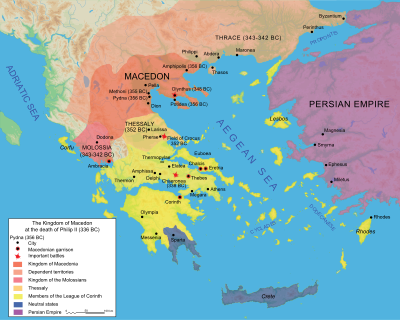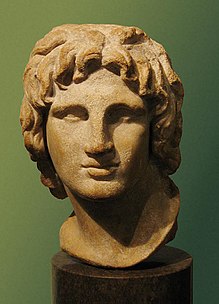ALEXANDER THE GREAT KING OF MACEDONIA AND THEIR EMPIRE
lexander the Great Alexander III the Great, the King of Macedonia and conqueror of the Persian Empire is considered one of the greatest military geniuses of all times. He was inspiration for later conquerors such as Hannibal the Carthaginian, the Romans Pompey and Caesar, and Napoleon. Alexander was born in 356 BC in Pella, the ancient capital of Macedonia. He was son of Philip II, King of Macedonia, and Olympias, the princess of neighboring Epirus. He spent his childhood watching his father transforming Macedonia into a great military power, winning victory after victory on the battlefields throughout the Balkans. When he was 13, Philip hired the Greek philosopher Aristotle to be Alexander’s personal tutor. During the next three years Aristotle gave Alexander a training in rhetoric and literature and stimulated his interest in science, medicine, and philosophy, all of which became of importance in Alexander’s later life. In 340, when Philip assembled a large Macedonian army and invaded Thrace, he left his 16 years old son with the power to rule Macedonia in his absence as regent, which shows that even at such young age Alexander was recognized as quite capable. But as the Macedonian army advanced deep into Thrace, the Thracian tribe of Maedi bordering north-eastern Macedonia rebelled and posed a danger to the country. Alexander assembled an army, led it against the rebels, and with swift action defeated the Maedi, captured their stronghold, and renamed it after himself to Alexandropolis.
He died in Babylon in 323 BC. Nobody knows the cause of Alexander's death. Some people have said his death was caused by poison in wine, murder or a fever after a battle.
When Alexander was 13, Philip began to search for a tutor, and considered such academics as Isocrates and Speusippus, the latter offering to resign to take up the post. In the end, Philip chose Aristotle and provided the Temple of the Nymphs at Mieza as a classroom. In return for teaching Alexander, Philip agreed to rebuild Aristotle's hometown of Stageira, which Philip had razed, and to repopulate it by buying and freeing the ex-citizens who were slaves, or pardoning those who were in exile.
Mieza was like a boarding school for Alexander and the children of Macedonian nobles, such as Ptolemy, Hephaistion, and Cassander. Many of these students would become his friends and future generals, and are often known as the 'Companions'. Aristotle taught Alexander and his companions about medicine, philosophy, morals, religion, logic, and art. Under Aristotle's tutelage, Alexander developed a passion for the works of Homer, and in particular the Iliad; Aristotle gave him an annotated copy, which Alexander later carried on his campaigns.
 STATUE OF ALEXANDER IN ISTANBUL,TURKEY.
STATUE OF ALEXANDER IN ISTANBUL,TURKEY.
 THE KINGDOM OF MACEDONIA IN 336 B.C
THE KINGDOM OF MACEDONIA IN 336 B.C
 MAP OF ALEXANDER EMPIRE AND HIS ROUTE
MAP OF ALEXANDER EMPIRE AND HIS ROUTE
 NAME OF ALEXANDER IN EGYPT HYGROLIPHS
NAME OF ALEXANDER IN EGYPT HYGROLIPHS







No comments:
Post a Comment